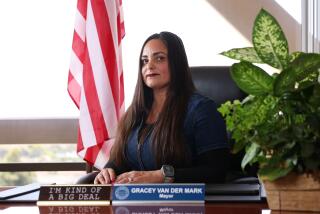Woman Promotes the Right to Go Topless
- Share via
SACRAMENTO — As a Ventura County public defender, Liana Johnsson has handled many life-changing cases, but her biggest public crusade these days has been going topless.
For months, Johnsson has been fighting to allow topless women at California beaches and parks, and now the issue has made its way to the Capitol.
A group of lawyers, at Johnsson’s request, has asked the Legislature to make topless sunbathing legal, saying the ban is the last criminal sanction that treats women differently than men.
The new movement has urgency: Because of a December court ruling, Johnsson and other attorneys contend, women convicted of indecent exposure could find themselves listed as sex offenders under Megan’s Law, alongside rapists and child molesters.
“At some point, men’s breasts became liberated and women’s didn’t,” Johnsson said Friday. “This is the only thing left that men are legally allowed to do and, for women, they have to register as a sex offender. The real issue is there should be equal protection under the law.”
The office of state Atty. Gen. Bill Lockyer said women should not be concerned about being identified as sex offenders, given that California law considers topless sunbathing to be indecent but not lewd. Lawmakers may soon be tackling the issue to remove any chance of misinterpretation by local prosecutors.
Before her idea reached Sacramento this week, Johnsson presented her arguments to more than 400 delegates at an October bar association convention. She flashed images on a screen of the big-breasted male evildoer from “Austin Powers: The Spy Who Shagged Me,” as she spoke.
Johnsson -- who wears a pink badge that reads, “I support breast equality” -- also has produced a two-minute video featuring obese men with large breasts lounging on California beaches, proof, she said, that the law is not applied equally to men and women, as required by the U.S. Constitution.
After a bit of tittering followed by a plea to protect children, the lawyers’ group approved a resolution asking that the criminal codes forbidding topless sunbathing be removed. Lobbyists for the Conference of Delegates of California Bar Associations said they expect a lawmaker next week to introduce the bill Johnsson seeks, although an author and details of the proposal have not been decided.
The issue goes beyond topless sunbathing. The conference lobbyist, Randy Perry with Aaron Read & Associates, questioned whether fraternity boys mooning out a car window or golfers caught urinating in the woods would also be required to register as sex offenders now, if convicted of indecent exposure.
“What we’re talking about is common sense,” said Perry.
He noted that since California legalized public breastfeeding in 1998, the only area of the law exclusively targeting women has been topless sunbathing.
Perry said the 2005 bill would either exempt topless women from Megan’s Law, make topless sunbathing an infraction instead of a misdemeanor or let judges decide whether to require sex offender registration.
In an Orange County case last month, a state Court of Appeal ruled that anyone convicted of misdemeanor indecent exposure must be listed as a sex offender under Megan’s Law. The databank recently was placed on the Internet, so people can search it for sex offenders.
The court said including indecent exposure offenders is not cruel and unusual punishment because Megan’s Law is not technically a “punishment” but simply a regulatory tool. Lawyers in the case said trial judges and prosecutors should have the discretion to decide, but the court took that away.
“Can you imagine the burden on police to now have to track all these people?” asked Carol E. Lavacot, the Orange County public defender who challenged the ruling in the 4th Appellate District. “It’s a way overboard decision.”
It’s extremely rare for women to be convicted of misdemeanor indecent exposure for going topless or, as the law currently reads, exposing “any portion of the breast at or below the upper edge of the areola of any female person.”
Officials at the California Department of Parks and Recreation say it has not been a priority for them to cite women at its 278 parks and beaches. California has dozens of unofficially designated nude beaches and rivers, including the popular Black’s Beach near San Diego, where people lie about in the nude, mostly without interference from police or rangers.
“Our rangers -- how can I put this? -- are very busy,” said Joe Rosato, a parks department spokesman. “It’s a low, low priority. Instead, what the rangers do is ask the women to put their tops on, and usually it’s 100%. If there are any indecent exposures, it’s more of a flasher or someone jumping out of bush exposing themselves.”
For its part, the state attorney general’s office said Megan’s Law would apply only if the woman has “lewd intent” -- and topless sunbathing is not normally considered lewd. In addition, they said, a misdemeanor conviction for indecent exposure requires only registration under Megan’s Law, not public disclosure on the new government websites.
The office of Gov. Arnold Schwarzenegger declined to comment on the possible legislation, and it was unclear if the governor would rank this effort as one of the “silly” bills he says the Legislature often dreams up. “You’ve got to be kidding me,” spokeswoman Margita Thompson said in an e-mail when asked to comment.
The legislation probably faces a fight. Lawmakers in California have been eager to expand Megan’s Law, not carve out exemptions.
Randy Thomasson, president of Campaign for Children and Families, called it a “loopy idea” at a time when California needs to strengthen laws against public nudity.
“We already have too many sexual assaults in society. This will fuel that fire, and if the women don’t understand, that’s because they don’t think like a man,” Thomasson said.
But Johnsson countered the notion that “if you allow topless sunbathing on state beaches ... civilization will collapse. I tried to show that we have faced these same fears, like when we gave women the right to vote and enter the armed forces, and we have survived.”
More to Read
Get the L.A. Times Politics newsletter
Deeply reported insights into legislation, politics and policy from Sacramento, Washington and beyond. In your inbox twice per week.
You may occasionally receive promotional content from the Los Angeles Times.










